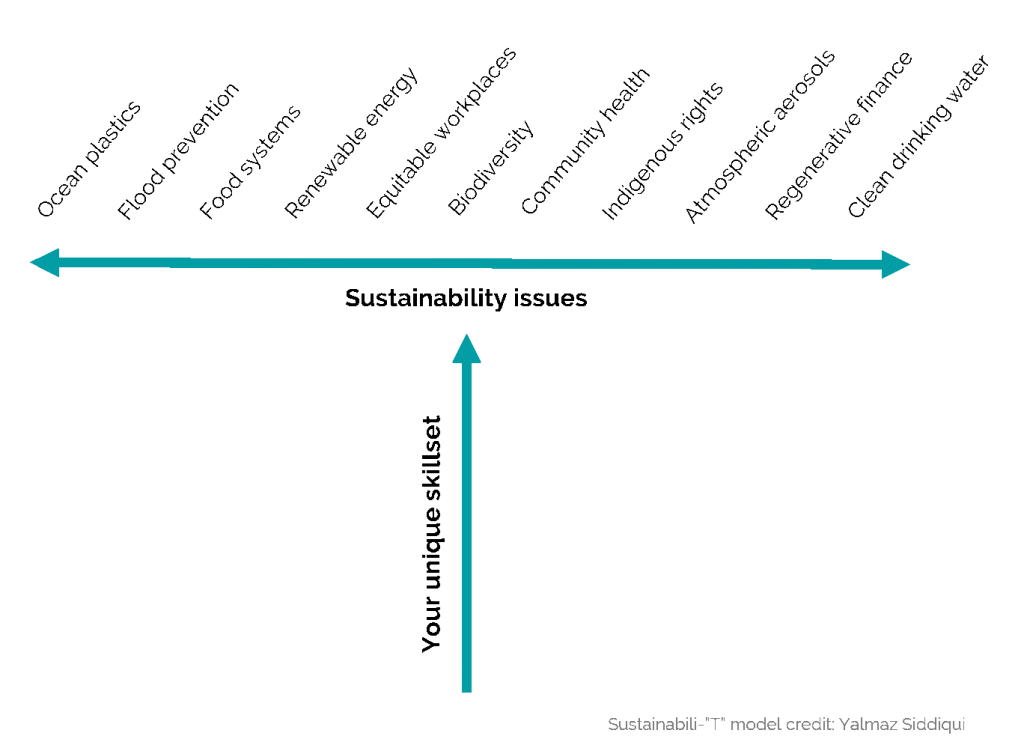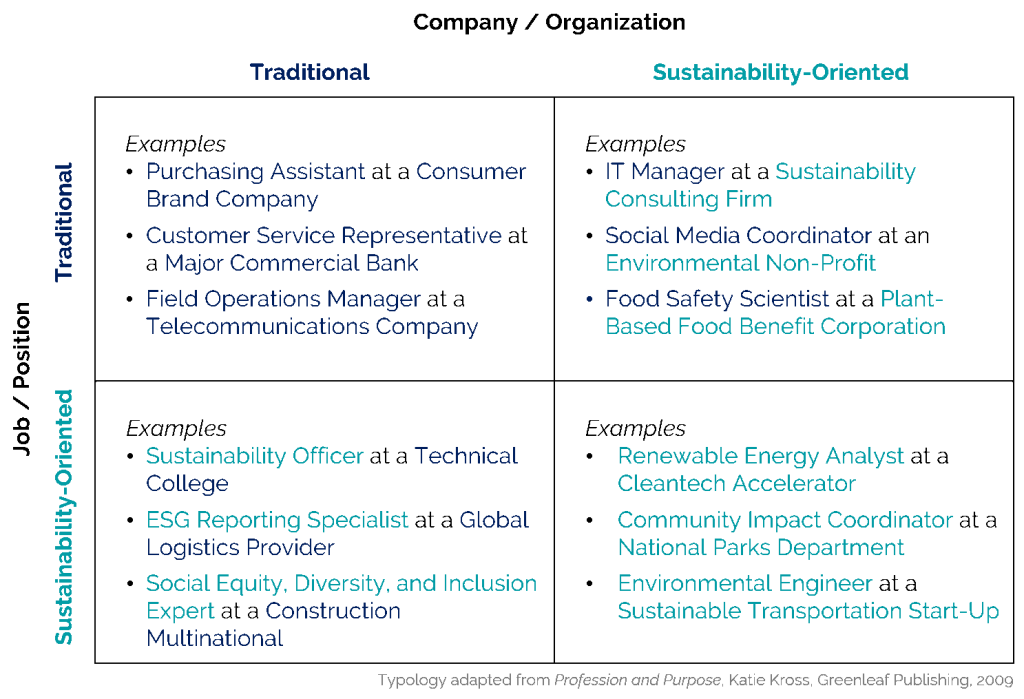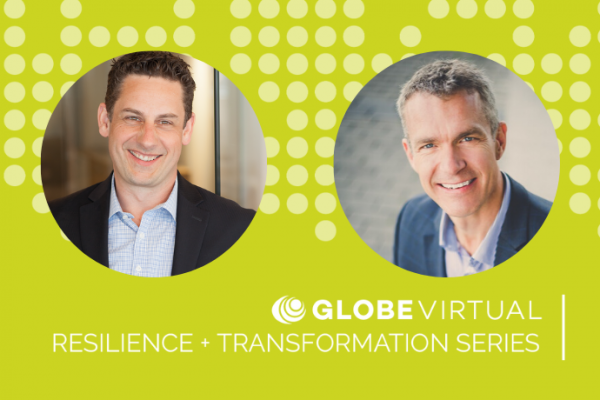By Megan Poss, Executive Director, Leading Change
Over the last decade, I’ve had hundreds of conversations with students and young professionals seeking advice on how to “break into” the sustainability field. Although the COVID-19 economic and health crisis has placed unprecedented challenges on job seekers, it doesn’t change the fact that there are still many passionate, courageous and visionary people out there who are determined to land their dream sustainability job—or at the very least, take steps to get there.
While there is no single path or secret formula, I’ve learned a few tips and frameworks in my time supporting youth in sustainability that I would love to share with you. I recognize that, as a white, cis-gendered woman with an easy-to-pronounce name, privilege has been on my side in many job-seeking experiences. Knowing this, much of the advice I offer has been informed from listening and learning from young people who inspire me and mentors I admire who hold different identities, backgrounds and experiences from myself. I encourage you to research broadly, test different strategies and apply what works best for you.
Without any further ado, here are my top five tips on launching a career in sustainability:
1. Take care of yourself so you can keep your head in the game.
The job search and recruitment process can be long and competitive, especially given the uncertain economic outlook. Before diving into job boards and firing off applications, check in with yourself and assess how you’re doing emotionally, psychologically, and financially.
This is a stressful and scary time for a lot of young people dealing with the double whammy of living through a global pandemic and a climate crisis. Only you will know what strategies work best for you and your situation, whether that’s talking about your fears with supportive friends, family, or professionals; finding an outlet that helps to process grief and ease stress; or taking advantage of free mental health resources. Reach out if you need to and know that you are not alone.
Finances can also understandably be a major source of stress. If you’re a current student or recent graduate, familiarize yourself with government funding support available. If you need to bring cash in the door and you’re in a situation that allows you to do so, consider rolling up your sleeves and taking on hours with an essential service that is hiring. No one, including a prospective employer, should lay judgment on a gap in your CV or the work you’ve taken on to get through a tough period. We need to destigmatize periods of under- and unemployment, particularly in this moment.
2. Build your sustainabili-“T”.
Most Millennials and Gen Z’s care, passionately even, about environmental and social issues. This is amazing. However, passion alone won’t advance the causes you care about without applicable skills.
Employers are looking for those skills, too. One of the best pieces of career advice I’ve heard was from Yalmaz Siddiqui, now Vice-President of Corporate Sustainability at MGM Resorts International: No one is going to pay you to sit at a desk and be passionate. That passion needs to somehow translate into action.
There are lots of tools and resources out there to help identify the skills you enjoy and are good at (or will eventually become good at over time). If you’re a student, reflect on the subjects you enjoy, the hobbies you take on in your downtime, or the role you naturally take on in groups. If you’re in a position to do so, volunteering and student extracurricular leadership positions can be valuable ways to test out, improve, or diversify your skillset while giving back to the issues you care about.
If you’re an early-stage professional, this is the ideal time to be curious and say “yes” to different tasks or assignments that come your way. You don’t know what you might like until you try it. I never would have thought I’d enjoy sales and fundraising, but with preparation, practice, and passion for the causes I’m supporting, I’ve grown to really enjoy forging relationships with partners. You can also join or initiate a Green Team for your organization and offer to take on a role that includes skills you’re looking to hone or refine, with the added bonus of adding some sustainability-related project experience to your CV.
Your skills and interests will likely evolve over time and you may develop several areas of expertise that can be applied in nearly any organization type or sector. As Yalmaz explained, think of a “T” where your skillset can be applied across a wide range of sustainability issues.

3. Any job can be a sustainability job.
Although there are organizations out there hiring Sustainability Directors, Sustainability Officers, or teams of analysts and consultants to drive initiatives forward, looking for the rare gems with “sustainability” right in the title can be discouraging even in the best of economic times.
In an effort to bring additional credibility to their role as a sustainability leader, some people pursue a designation as an environmental professional (where 50% or more of your time is spent on tasks relating to environmental protection, resource management, or environmental sustainability), or become a certified sustainability professional.
If you don’t have the time or resources to pursue credentials, the good news is we’re now in an era where environmental and social concerns are drawing the attention of employers, investors, shareholders, and government leaders. With that comes the opportunity to integrate sustainability across any organizational department, function, or role.
Regardless of the role, if you’re in an organization with a culture that welcomes employee ideas and input, you can incorporate sustainability principles into daily decision-making and actions. In fact, influencing the decisions in a department that isn’t typically associated with sustainability can spark novel ideas and opportunities to make an early-career impact. Of all the advice I dole out, this is what I’ve seen create the most positive response in students and young people. Taking the pressure off finding that unicorn job posting opens infinitely more doors.
4. Scout out organizations where you feel at home (whether you’re working from home or not).
If you’re lucky enough to be choosing between organizations, it helps to narrow down where you’ll feel most at home. I frequently refer to a matrix developed by Katie Kross of Duke University and illustrated in her book, Profession and Purpose.

Do you have a skillset that any employer would find valuable? Look to the top right quadrant: a role in a more traditional function (e.g. accounting, marketing, quality control) within a mission-driven organization could be a great fit. Do you enjoy educating people and making the case for cleaner, more equitable ways of doing things? You may feel at home in the bottom left-hand quadrant. Look for sustainability, environment, CSR, or strategy roles in a more traditional organization. Do you have sustainability-specific credentials or skills (e.g. the ability to do greenhouse gas analysis) under your belt? You may be well placed to secure a more niche position in the bottom right-hand quadrant at an organization with sustainability at the core of its mission and services.
Don’t overlook opportunities that fall into the upper left-hand quadrant of more traditional roles in traditional organizations. As mentioned in tip #2, having influence and decision-making agency in a role that doesn’t typically tackle sustainability can be powerful. It can also allow you to develop new skills, get to know the company culture, and eventually position yourself for a sustainability-specific role.
Another element to consider is culture fit. Doing your best work requires a workplace environment where you feel accepted, included, and empowered to show up as yourself. The current pandemic is forcing many organizations to show their true colours. How are they treating their employees? What about members of their supply chain? Are they still investing in their community? Are they still investing in equity, diversity, and inclusion? Take note of those that are leading with integrity during this time, even if they’re not currently hiring.
5. Build out and lean on your community.
Despite the economic downturn, there are organizations that have baked sustainability measures into their long-term strategy and are actively looking for talented young individuals who can execute on these mandates. Look to job boards and sites dedicated to environmental postings. Create an account and be alerted of new opportunities through the Canada Summer Jobs program. Follow and engage with the social media accounts of your targeted employers so you don’t miss an opportunity.
Some challenges that creep up when looking for jobs is that you may put in a lot of effort for a position that’s ultimately not a good fit—or worse, look over a potentially awesome employer because you don’t know anything about them. This is where your network can help—people who know you and can provide suggestions or keep an eye out for opportunities where you’re likely to shine.
Oftentimes insight and connections to different organizations comes through experience. Seek out established professionals and start building your mentoring constellation—a diverse circle of supportive relationships that lead to more productive, satisfying, and impactful career paths. If you’re reaching out to someone you don’t already know, make sure to develop a clear plan for requesting career guidance (and don’t ask for a job!).
Supportive peers are just as important as mentors. Reach out to friends, classmates, or former colleagues you trust and let them know you’re actively looking for opportunities. Provide them with your parameters (e.g., type of role, location, industry, etc.) and offer to keep an eye out for them if they’re in the same boat. Peers, and in particular those who are going through a similar journey, can offer empathy and psychosocial support when dealing with challenges, setbacks, or distress. Stay in touch and nurture these relationships over time.
—
While I hope these tips can be useful, they’re certainly not exhaustive. There is a kaleidoscope of lived experiences and a cornucopia of advice out there. Over the next few months, Leading Change will be elevating the stories of emerging and established leaders to help young Canadians find, keep, or pivot into meaningful employment.
I invite you to join Leading Change’s first webinar in partnership with GLOBE Virtual on Finding a Job with Purpose During a Pandemic on Thursday, May 28 at 2:00-3:00pm PT/5:00-6:00pm ET. I’ll be joined by some amazing people who have faced rough markets or roadblocks on their path to securing meaningful employment. They’ll offer their own insight, tips, and strategies for pursuing a career path with purpose when times are tough.
Learn more and register here.
Leading Change is a national non-profit organization for and by young leaders and sustainability professionals accelerating action on issues that are critical to attaining a sustainable, prosperous, and socially just future within a generation. GLOBE Series and Leading Change are part of a constellation of organizations that also includes the Delphi Group and the EXCEL Partnership.




